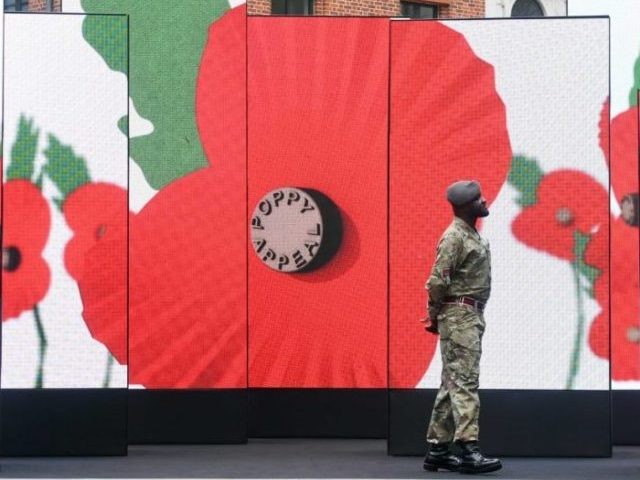Britain’s liberal media has used the Remembrance period to attack the customary wearing of poppies as a mark of respect to the war dead.
The Guardian says it should be changed from a symbol “sanitising war” into a conscience emblem, while the Independent has launched a full-scale attack, slamming the symbol as “racist”.
Poppies have been worn as an act of remembrance very nearly since the close of the First World War itself. The first “Poppy day” appeal in Britain in 1921 raised £106,000 on behalf of veterans when 9 million flowers sold out within days.
The Royal British Legion is clear about the symbolism of the poppy on its website, explaining: The poppy is a symbol of Remembrance and hope … [it] is not a symbol of death or a sign of support for war”.
Early efforts, made in 1926, to alter the meaning to that of conscientious objection, such as making the poppy white or adding the words “no more war” to the centre of the flower, failed.
But Ted Harrison at The Guardian insists that the flower was originally a symbol of pacifism, and that it should reclaim that role.
“When the poppy was first adopted as the symbol of remembrance it was shortly after the end of the first world war, when almost every family in the land still felt the raw grief of the time. The poppy represented mourning and regret, and served as a pledge that war must never happen again,” he misleadingly writes.
“Over the decades, as the memory of both wars began to fade, the poppy began to take on a subtle new meaning. To many people it had become a patriotic duty to wear one, a symbol of pride in the sacrifices of the armed services. Indeed all those who had ever worn a military uniform had become ‘heroes’, and the dead were described euphemistically as ‘having fallen’.
“In an utterly unintended way the remembrance customs now serve to sanitise war and even to make the military option a respectable political option.”
His solution is for remembrance services to be reclaimed – indeed, sanitised – to remove all military traces.
“I would suggest several changes to the central Cenotaph service, which could be reflected in local ceremonies,” he pompously proclaims.
“First, that only the Queen, and not politicians, should lay a wreath. This would be on behalf of the nation and the commonwealth. Second, that a simple religious service be held following the two-minute silence. That no troops formally line up in uniform, there is no martial music and no gun fired. Third, that at the end of the service a line of victims of war, such as injured service men, widows, displaced civilians and refugees files past the cenotaph in silence.”
Robert Fisk at the Independent says the poppy is not merely a subverted peace symbol – it’s racism iconified.
He writes: “Yes, the boys and girls of the BBC and ITV, and all our lively media and sports personalities and politicians, are at it again. They’re flaunting their silly poppies once more to show their super-correctness in the face of history, as ignorant or forgetful as ever that their tired fashion accessory was inspired by a poem which urged the soldiers of the Great War of 1914-18 to go on killing and slaughtering.
“Who are they commemorating? The dead of Sarajevo? Of Srebrenica? Of Aleppo? Nope. The television bumpkins only shed their crocodile tears for the dead of First and Second World War”
He then accuses the country of hypocrisy in commemorating a war fought on behalf of European people (which he assumes means European unity) while in the midst of Brexit, before continuing:
“Our international [TV] screens never show the slightest clue of Eid festivities (save again for news stories) lest this, too, offends another ‘culture’. Yet the poppy just manages to sneak onto the screen of BBC World; it is permissible, you see, the very last symbol that ‘our’ dead remain more precious than the millions of human beings we have killed, in the Middle East for example, for whom we wear no token of remembrance.
“And in this sense, I fear that the wearing of the poppy has become a symbol of racism.”
The poppy appeal raised £48.5 million for veterans last year.

COMMENTS
Please let us know if you're having issues with commenting.